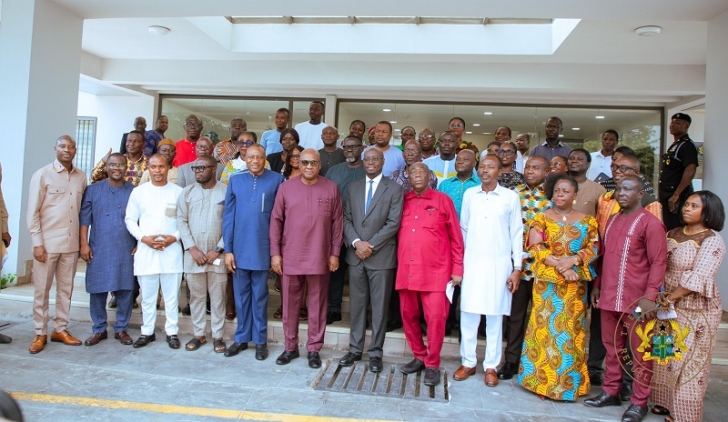
Government appeals to labour unions to consider economic difficulties in salary negotiations
President John Dramani Mahama has urged labour unions to take Ghana’s economic challenges into account as they negotiate new wage adjustments.
He made the appeal on Thursday, February 20 2025, at a meeting with the National Tripartite Committee at the Ministry of Labour, Jobs, and Employment, ahead of his first cabinet session since being sworn in for a second term on 7 January 2025.
Speaking at the meeting, Mr Mahama acknowledged the difficulties workers face but stressed the need for financial discipline to help the economy recover.
He assured that wages would be adjusted as conditions improve.
“We all knew the economy was in crisis, but some of the things I’m discovering myself… I mean, it’s been a criminal handling of our economy, and Ghana is a crime scene, actually,” he said.
“How a government could have been so reckless, I cannot understand.”
He noted that while workers’ demands are valid, the economic situation requires sacrifices from all sectors, including the government.
“We can behave like the ostrich and hide our heads in the sand and let the economy crash, but then what effect would it have on Ghanaian households and everybody?” he asked.
Following discussions, the National Tripartite Committee announced a 10% increase in the National Daily Minimum Wage (NDMW) for 2025, raising it to GHS 19.97.
The new wage, which takes effect on 1 March 2025, was determined based on economic conditions, the cost of living, business sustainability, and employment growth.
Minister for Labour, Jobs, and Employment, Dr Abdul-Rashid Hassan Pelpuo, said the government recognised workers’ concerns but urged balance in the negotiations.
“We have taken into account the economic realities and the need to protect workers while ensuring businesses can sustain operations,” he stated.
Mahama pledges to cut government spending
Mr Mahama assured workers that public officials would not be exempt from the sacrifices needed to rebuild the economy.
“I think this trust deficit in the political class has come about because while everybody else is tightening their belts, the political class is loosening theirs,” he said.
“But I want to assure you that we’re all going to tighten our belts, and there will be no wasteful spending.”
To back his words with action, he revealed that he had directed cuts in the Office of Government Machinery’s budget. “Even we ourselves, cut as much of our budget as you like because we all must make those sacrifices,” he told the committee.
He compared the current economic situation to a struggling kitchen. “Right now, the meal is not only insufficient, but the cooking pot is even leaking,” he said.
“So I just appeal to you, let’s temper our demands for this year. Once we get out of the woods, we’ll set good targets to bring inflation down, so that the cost of everything will come down.”
Calls for independent salary committee
Mr Mahama also proposed an independent emoluments committee to set salaries for all public sector workers, including politicians.
“We are proposing an independent emoluments committee that would set the incomes for everybody, from the president right down to the ordinary labourer,” he explained.
“We are prepared to walk this journey with you, but I just appeal to you, let’s reach an agreement on this one and use this year as the year of correction.”
He assured labour leaders that once the economy stabilises, wages would be reviewed again.
“When the cake is baked and bigger, we will all share bigger,” he said.
“If we have an independent emoluments committee, maybe if you suggest 35% next time, I’ll support you because it will affect my pay too.”
The National Tripartite Committee, which consists of government officials, employers, and organised labour representatives, is responsible for setting the country’s minimum wage and overseeing public sector salary negotiations.
Its decisions play a crucial role in shaping the financial stability of millions of Ghanaian workers.
Ghana’s public sector workers last received a salary increase in 2024 when the government approved a 23 per cent raise to help cushion them against the rising cost of living.
